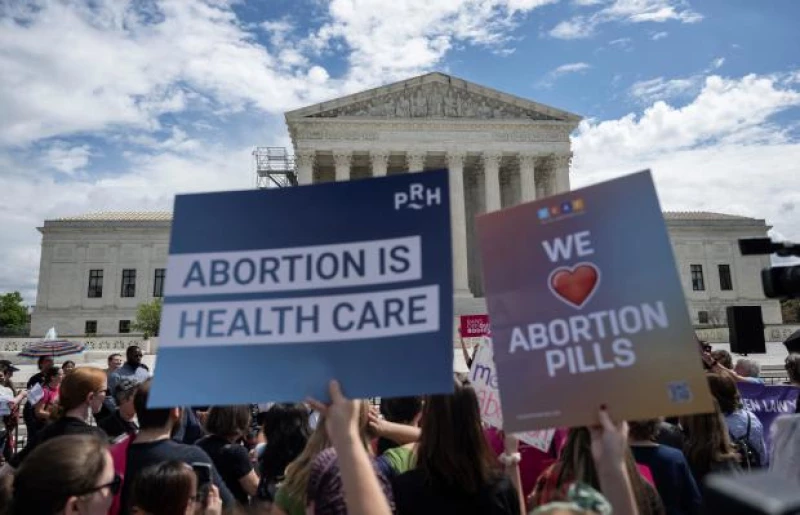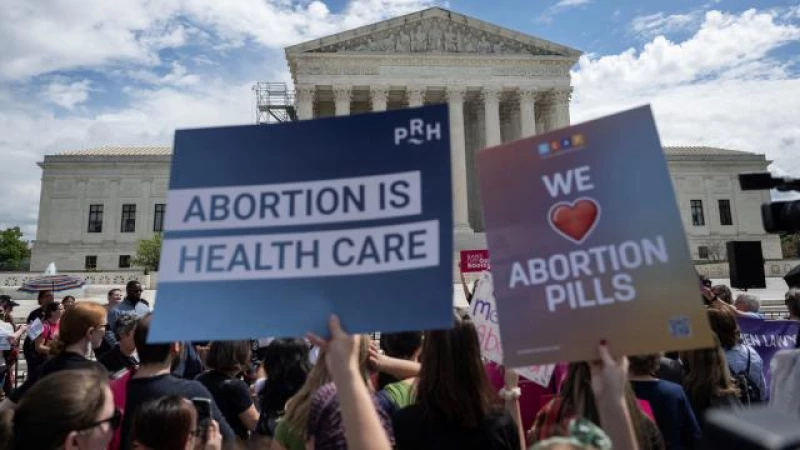Washington — Twenty months after the Supreme Court ruled to return abortion policy to the states, the issue will be before the justices again on Tuesday, when they weigh a case that threatens to curtail access to a commonly used drug taken in a medication abortion.
The dispute involves a series of actions that the Food and Drug Administration took beginning in 2016 that made the pill, mifepristone, easier to obtain. A group of medical associations that oppose abortion rights have argued the agency acted unlawfully when it relaxed the rules surrounding mifepristone's use.
The justices will first have to consider a procedural issue — whether the doctors and their associations have legal standing to challenge the FDA's efforts in federal court — before deciding whether the FDA's changes complied with the law.
Hanging in the balance is the availability of the pill nationwide. States that restrict abortion access and those that protect it would all be impacted by a decision that rolls back the FDA's recent moves.
The surge of medication abortions
Describing how mifepristone has been subjected to stricter regulations and more intense studies compared to other drugs, a spokesperson highlighted the evolving landscape of medication abortions.
A recent study by the Guttmacher Institute revealed that medication abortions constituted over 50% of all abortions in the United States in 2023. This marks a significant increase from the previous year, with pills accounting for 63% of all abortions within the healthcare system in 2023, up from just over half in 2020.
The rise in medication abortions over the past three years can be attributed to the FDA's efforts to enhance access to mifepristone. By permitting the drug to be distributed via mail, the agency removed the necessity for in-person dispensing, a policy change initially implemented as a response to the COVID-19 pandemic and later made permanent in late 2021.
The Supreme Court is now reviewing whether the FDA acted lawfully when it made that move, along with several other steps the agency took in 2016 surrounding mifepristone's use. As part of the 2016 actions, the FDA allowed mifepristone to be taken later in a pregnancy, increasing the gestational age limit from seven to 10 weeks. It also reduced the number of in-person visits required by a patient undergoing a medication abortion from three to one, and allowed more health care providers to prescribe the drug.
"This isn't just any method of abortion," said Mary Ziegler, a University of California, Davis, law professor who is a leading historian on the abortion debate in the U.S. Not only is it the most popular, but medication abortion is "one that is uniquely important at a time when abortion is a crime in a lot of places," she continued.
Twenty-one states have either banned or restricted abortion since the Supreme Court overturned Roe v. Wade in June 2022.
How the case arrived at the Supreme Court
The FDA first approved mifepristone in 2000. It's taken with a second drug, misoprostol, to terminate an early pregnancy. In the more than 20 years since mifepristone became available in the U.S., more than 5 million women have taken the drug, according to the agency.
Serious adverse events as a result of mifepristone are "exceedingly rare," the FDA said, and studies show that hospitalization of women who have taken the drug occurs in less than 1% of cases.
Years after the FDA initially approved mifepristone, a coalition of medical organizations opposed to abortion rights filed a lawsuit in federal court in Texas challenging the legality of the drug's approval and subsequent changes. They argued that the FDA lacked the authority to approve mifepristone and did not adequately assess its safety and efficacy.
U.S. District Judge Matthew Kacsmaryk, presiding over the case, concurred that the FDA's actions in 2000 and beyond were likely unlawful. He halted the FDA's approval of the drug for sale in the United States.
However, Kacsmaryk temporarily suspended his decision for a week, triggering a flurry of legal actions from a federal appeals court and the Supreme Court. In April 2023, the Supreme Court maintained access to mifepristone while legal proceedings unfolded.
Following the Supreme Court's emergency intervention, the U.S. Court of Appeals for the 5th Circuit upheld the FDA's 2000 approval of the abortion pill but criticized the agency for recent rule changes regarding its usage.
The 5th Circuit clarified that its decision was superseded by the Supreme Court's earlier order safeguarding access, which remains in place until a final ruling is issued by the justices.
The Justice Department and Danco Laboratories, the manufacturer of Mifeprex, the branded version of mifepristone, petitioned the Supreme Court to review the 5th Circuit's decision, and the Court agreed to do so in December. A verdict is anticipated before the end of June.
The arguments in the mifepristone case

Before considering whether the FDA went too far with its 2016 and 2021 changes, the Supreme Court will first weigh whether the medical associations and their members sufficiently showed that they may be injured by the agency's actions, and that those alleged injuries can be traced to the FDA's relaxing of the rules for mifepristone.
The Justice Department argued in filings that the doctors involved in the legal challenge do not prescribe the drug and haven't identified a single case where a member has been forced to complete an abortion for a woman who shows up at an emergency room with an ongoing pregnancy.
The associations' theory of how one of their members may be harmed rests on a "long and speculative chain of contingencies," Solicitor General Elizabeth Prelogar wrote. Under their theory, a woman who takes mifepristone must suffer an "exceedingly rare serious adverse event" that requires emergency care. Instead of returning to the provider who prescribed the drug, the woman must then seek care from one of the association members or show up in an emergency room where a member physician is working.
The doctor would only be forced to complete the abortion if another physician wasn't available to help, or if the member couldn't invoke federal conscience protections for some reason, Prelogar reasoned.
Supreme Court Hears Arguments on FDA's Rules for Abortion Pill
During the recent hearing at the Supreme Court, lawyers representing the Alliance for Hippocratic Medicine expressed their objection to not only abortion itself but also to any involvement in the abortion process. The group, supported by the conservative legal organization Alliance Defending Freedom, argued that even providing medical care related to abortion procedures goes against their beliefs.

The lawyers highlighted instances where women harmed by abortion drugs were directed to emergency rooms by the FDA, and some sought treatment from doctors associated with the Alliance for Hippocratic Medicine. They emphasized that holding doctors accountable for such harm is necessary.
If the Supreme Court decides that the doctors did not demonstrate a clear injury, the case may be dismissed without a ruling on the legality of the FDA's relaxed rules on mifepristone. However, if the Court delves into the legal aspects of the case, the Justice Department and Danco defended the FDA's actions, stating that the changes made in 2016 were based on substantial medical evidence gathered over the years.
Acting Solicitor General Prelogar argued that the FDA's expertise should not be questioned by the courts, as it could set a precedent for limiting access to FDA-approved drugs based on judicial interpretations rather than scientific evaluations.
Physicians' attorneys argued that the FDA did not provide a sufficient explanation for lifting the requirement for in-person dispensing and criticized the studies the agency used as "deeply problematic."
The removal of the in-person visit mandate in 2021 removed the opportunity for healthcare workers to screen for ectopic pregnancies and other conditions, according to the associations. They further stated that in 2016, the FDA eliminated "interrelated safeguards without conducting comprehensive studies" on the overall impact of the changes.
Warnings of potential chaos
The possibility of the Supreme Court upholding the 5th Circuit's ruling has sparked concerns not only about the future of medication abortion but also about the fate of existing supplies of mifepristone.
"One scenario could lead to restricted or potentially eliminated access to mifepristone nationwide, resulting in significant chaos," Ziegler warned. "Even if the court follows the path of the 5th Circuit or supports it, it would still create numerous issues because all existing mifepristone stocks would be considered misbranded and mislabeled, necessitating actions from both Danco and the FDA to comply with the Supreme Court's decision."
Elisa Wells, the founder of Plan C, a website that provides information about how and where to get abortion pills, agreed that if the doctors prevail, it could cause "chaos, fear and harm" to those seeking medication abortions. But she said international telehealth providers and online vendors could help reduce the impact of a decision that unwinds the FDA's more recent changes.
"There will be an increase in demand and alternate routes of access," she told CBS News.
One of those organizations, Aid Access, is a major telemedicine provider of mifepristone, and has provided the pills to women across the U.S. Its founder, Dr. Rebecca Gomperts, said new shield laws in six states have allowed her group's prescribing to be done by domestic providers.
"Doctors have the right to prescribe medication outside of the label, so in that sense, it really doesn't matter what the Supreme Court says, because that is the discretion of medical providers," Gomperts told CBS News. "We are just going to continue no matter what the decision is. It won't affect our work."
As a backup, Gomperts said Aid Access could always go back to its initial model, in which Gomperts herself prescribed mifepristone remotely from Europe.
"The reality is the pills are not going to go away," she said. "Women will always get them, and we will do whatever it takes to get them to them."
Controversy surrounding the case
Amidst concerns about the potential impact of a ruling against the FDA, the controversy surrounding mifepristone has been ongoing since the Alliance for Hippocratic Medicine initiated the case 16 months ago.
Originating in Amarillo, Texas, where Kacsmaryk serves as the sole district judge, the lawsuit was practically guaranteed to be under his jurisdiction. Appointed to the federal bench by former President Donald Trump in 2019, Kacsmaryk had previously expressed critical views on abortion and Roe v. Wade.
The decision of the medical organizations to file the case in Amarillo led to allegations of "forum-shopping," a tactic where a party selects a court that is most favorable to them.
The Judicial Conference of the United States, the governing body of the federal judiciary, introduced a new protocol earlier this month, mandating that civil cases with statewide and nationwide implications be randomly assigned. This change aims to deter judge-shopping, as stated by U.S. Senior District Judge Robert Conrad, the secretary of the Judicial Conference.
Studies referenced by Kacsmaryk and the 5th Circuit in their rulings in support of the Alliance for Hippocratic Medicine have come under scrutiny. The American Civil Liberties Union cautioned the Supreme Court in a submission that the lower court judgments were based on "blatantly unreliable witnesses" and "ideologically biased pseudoscience."
The group raised concerns about the credibility of doctors who provided declarations in a previous stage of the case, noting that judges in other abortion restriction cases have criticized them. Furthermore, a study referenced by Kacsmaryk regarding the mental health effects of medication abortion was based on 98 anonymous blog posts from women recounting their medication abortion experiences between 2007 and 2018.
Moreover, a publisher of an academic journal retracted two studies from 2021 and 2022 that Kacsmaryk had cited. The decision came after a reader questioned the data integrity and potential conflict of interest due to the authors' affiliations with anti-abortion organizations.
Upon review by two experts, the articles were found to lack scientific rigor, leading to the invalidation of the authors' conclusions either entirely or partially, as stated by the publisher, Sage Journals.







